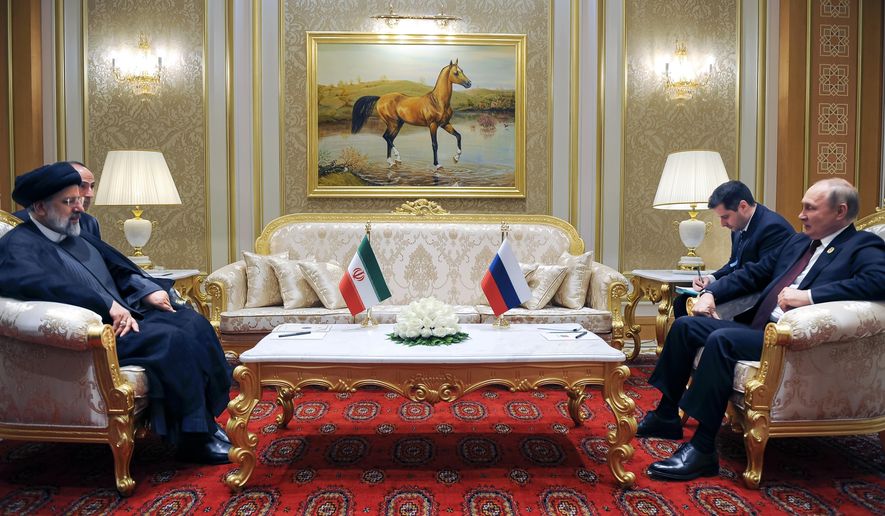President Biden’s trip to the Middle East risks getting upstaged by Vladimir Putin, who is headed to the region directly after Mr. Biden for meetings in Iran — a move the Kremlin announced a day after the Biden administration accused Tehran of supplying drones to aid Russia’s war in Ukraine.
Russian officials said Tuesday that Mr. Putin will hold talks with Iranian leaders and Turkish President Recep Tayyip Erdogan.
Mr. Erdogan met recently with Mr. Biden at a NATO summit and has sought to position himself as a mediator in the hot war between Russia and Ukraine.
The Putin-Erdogan meeting is likely to be overshadowed by Mr. Putin’s desire to counter Mr. Biden’s attempts this week to show leadership in the Middle East. Iran’s nuclear and ballistic missile programs and network of regional allies against the U.S. will be subjects of discussion.
Mr. Biden’s trip begins Wednesday in Israel and will be followed by a visit to Saudi Arabia. Administration officials said an overall goal of the visits is to promote stronger security coordination between Arab powers and Israel, both of which are hostile to Tehran.
The once-unthinkable pursuit has become an increasingly viable objective with shared Arab and Israeli concern about threats emanating from Iran. The Biden administration indicated this week that the threats reach well beyond the Middle East and involve direct Iranian support for Russia‘s war in Ukraine.
SEE ALSO: Ukraine-born Rep. Victoria Spartz intensifies row with Zelenskyy’s inner circle
The White House said Monday that it believes Russia is turning to Iran for “hundreds” of drones, including some capable of carrying weapons, to use in Ukraine.
National Security Adviser Jake Sullivan said it was not clear whether Iran had already provided any of the vehicles to Russia. He said the U.S. has information that indicates Iran is preparing to train Russian forces to use the drones as soon as this month.
Russian forces suffered heavy losses early in the invasion, which Mr. Putin ordered on Feb. 24 when Ukrainian drones proved adept at finding and targeting Russian tanks and command locations.
“Our information indicates that the Iranian government is preparing to provide Russia with up to several hundred [unmanned aerial vehicles], including weapons-capable UAVs on an expedited timeline,” Mr. Sullivan told reporters Monday.
The Kremlin responded within hours by announcing that Mr. Putin would travel to Tehran on July 19 for a trilateral meeting with Mr. Erdogan and Iran‘s hard-line president, Ebrahim Raisi. It will be a rare trip abroad for the increasingly reclusive Russian leader since the COVID-19 pandemic began in early 2020.
Kremlin spokesman Dmitry Peskov said the meeting will focus on Syria talks. Turkey, Syria and Russia are the primary backers of the Astana Process in search of a peace settlement to Syria’s more than decade-long civil war. Russian forces provided critical support to keep the regime of Syrian President Bashar Assad from collapsing.
The process has been thorny. Turkey, a NATO ally that borders Syria and has complex relations with Russia, has provided military support for rebels fighting Mr. Assad’s forces. Russia and Iran stand together as the chief political and military backers of the Assad regime.
The Russian-Iranian alliance has widened over the past year. Tehran has signaled its support for Moscow’s war in Ukraine, yet Russia is a signatory to the 2015 Iran nuclear deal that Mr. Biden is hoping to revive.
Mr. Putin’s visit to Tehran will be his second foreign trip since Russian forces invaded Ukraine. The Russian president visited Turkmenistan in late June for a summit of Caspian nations that included an appearance by Mr. Raisi.
Mr. Putin hosted the Iranian president in Moscow weeks before ordering the Russian invasion of Ukraine.
During the January summit, Mr. Raisi endorsed the Kremlin’s complaints about the eastward expansion of NATO, which Russian officials attempted to cite as justification for invading Ukraine.
“The infiltration of NATO under any guise in the Caucasus and Central Asia will threaten the common interests of independent countries,” the Iranian president said at the time, according to a report by Al Jazeera. The report noted that Mr. Raisi and Mr. Putin discussed stronger Iranian-Russian ties on multiple fronts.
A U.S. Institute of Peace analysis published after the summit said that “Russia and Iran have had a rocky relationship since the early 19th century, when the Russian Empire annexed a large amount of Iranian territory.”
“But the two countries have expanded political, economic and military cooperation since the early 2000s,” said the analysis, noting that “both oppose the U.S.-led world order, support the Assad regime in Syria, and see Sunni jihadist movements, such as ISIS, as serious threats.”
Iranian officials have made no secret of their military support for Russia. A spokesman for the Iranian Foreign Ministry on Tuesday did not deny the U.S. claim that Tehran was supplying drones and training to Russian forces.
“Iran’s cooperation with Russia in some sophisticated technologies dates to before the Russia-Ukraine war,” a spokesman for the Iranian foreign minister said. “There has not been any special development in this regard recently.”
Iran has long worked on the development of drones, including so-called loitering munitions, the “kamikaze” drones like the Switchblade that the U.S. has delivered to Ukraine.
Because of domestic interests, Israel and Saudi Arabia have resisted joining Western sanctions to punish Russia for its action in Ukraine. With Russia now largely cut off from Western markets and banks, Moscow and Tehran have even more in common than before the invasion.
Mohammad Reza Pour Ebrahimi, the head of the Iranian parliament’s economic committee, told state-run news agency IRNA that Mr. Putin’s trip would help improve economic relations between the two sanctions-hit nations.
• This article is based in part on wire service reports.
• Guy Taylor can be reached at gtaylor@washingtontimes.com.




Please read our comment policy before commenting.